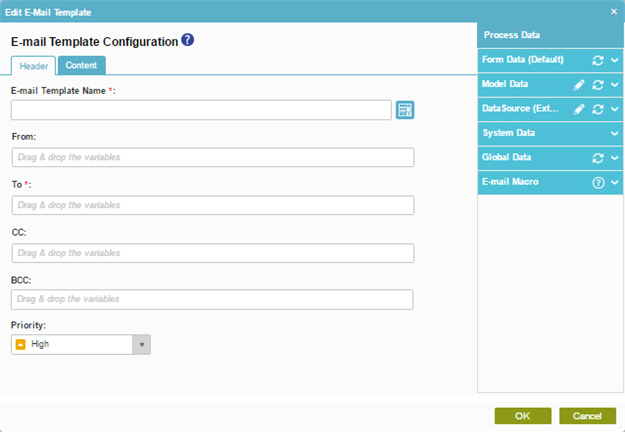Configures the header for an e-mail template.
Figure: E-mail Template Configuration Header screen

Video: Add an E-mail Activity
How to Start
- Do one of these:
- On the Application Explorer screen,
do one of these:
- In the Process Builder, in the My Application pane, expand
your application, and do one of these:
- Click Notification
- Click E-mails
 .
.
- Do one of these:
- To create an e-mail template, click New
 .
.
- To change an e-mail template, click the template, and click Edit
 .
.
- Click Process Model
- Double-click your process.
- Click Notification
 >
E-mail Template
>
E-mail Template  .
.
- On the E-mail Template screen, in the Model Template, click Add
 .
.
Fields
| Field Name |
Definition |
|
E-mail Template Name
|
- Function:
- Specifies the name of your e-mail template.
- Accepted Values:
- One line of text that can have spaces.
- Default Value:
- None
- Example:
- Refer to:
|
|
Clone E-mail Template 
|
- Function:
- Specifies your e-mail template from the list.
|
|
From
|
- Function:
- Specifies the senders in the From field of an E-mail Notification.
- Accepted Values:
- A valid e-mail address.
- Default Value:
- None
- Accepts Process Data Variables:
- Yes
- Example:
- me@mydomain.com
|
|
To
|
- Function:
- Specifies the recipients for your e-mail.
- Accepted Values:
-
- A list of valid e-mail addresses, separated by semi-colons (;).
If you use process data variables, domain\username is changed
automatically to a valid e-mail format .
- A macro that accepts a process data variable
as parameter.
For more information, refer to
Built-In Macros.
- Default Value:
- None
- Accepts Process Data Variables:
- Yes
- Example:
-
- me@mydomain.com
- $MANAGER(DOMAIN\john)
- $MANAGER(${/my:myFields/my:username})
Also refer to:
|
|
CC
|
- Function:
- Specifies the recipients to carbon copy on your e-mail.
- Accepted Values:
-
- A list of valid e-mail addresses, separated by semi-colons (;).
If you use process data variables, domain\username is changed
automatically to a valid e-mail format .
- A macro that accepts a process data variable
as parameter.
For more information, refer to
Built-In Macros.
- Default Value:
- None
- Accepts Process Data Variables:
- Yes
- Example:
-
- me@mydomain.com
- $MANAGER(DOMAIN\john)
- $MANAGER(${/my:myFields/my:username})
|
|
BCC
|
- Function:
- Specifies the users to receive a blind carbon copy of your e-mail.
- Accepted Values:
-
- A list of valid e-mail addresses, separated by semi-colons (;).
If you use process data variables, domain\username is changed
automatically to a valid e-mail format .
- A macro that accepts a process data variable
as parameter.
For more information, refer to
Built-In Macros.
- Default Value:
- None
- Accepts Process Data Variables:
- Yes
- Example:
-
- me@mydomain.com
- $MANAGER(DOMAIN\john)
- $MANAGER(${/my:myFields/my:username})
|
|
Priority
|
- Function:
- Specifies the priority setting for an e-mail notification.
- Accepted Values:
-
- Default Value:
- High
|

 .
. .
.
 .
.
 >
E-mail Template
>
E-mail Template  .
. .
.


